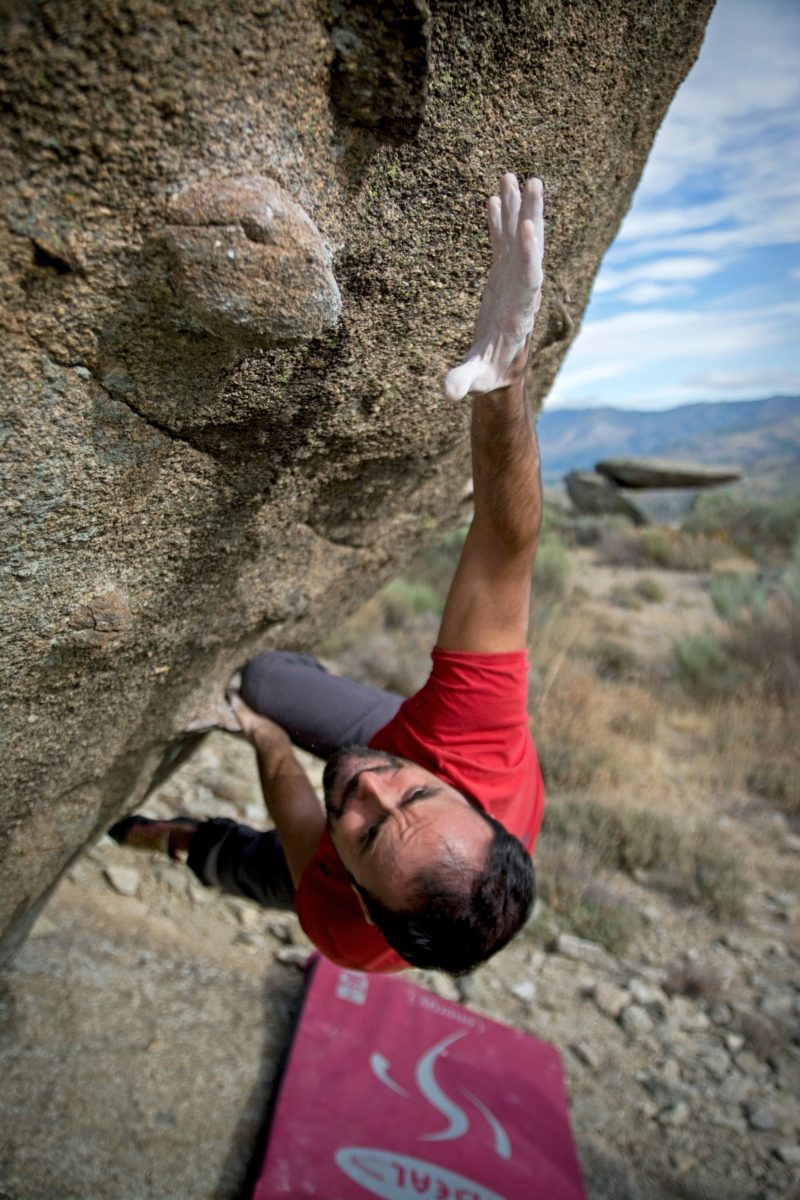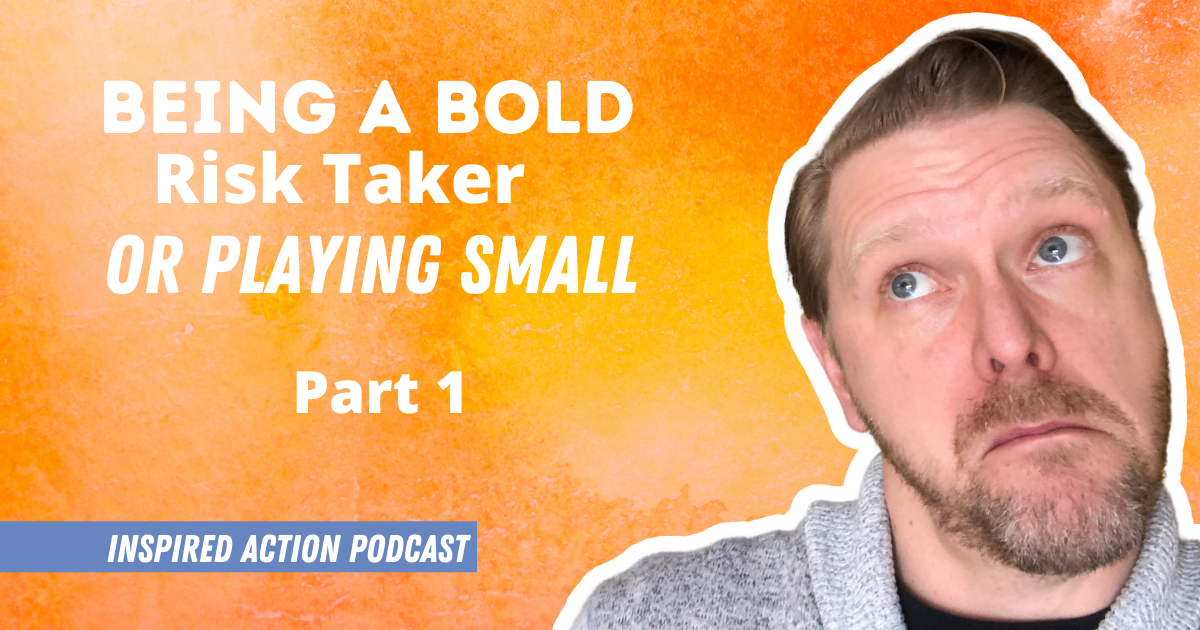“Being a Bold Risk Taker or Playing Small” – Part 1 – Brief Summary:
“When a leader hears you want to be challenged without definition or specificity, it says to them you want more work. You need to be clearer with what you actually want and desire.”
Are you a bold risk taker and ask for what you want, or do you play small? In this Inspired Action for Imperfect Humans podcast episode, Christopher Lawrence and Kyle Kalloo discuss asking for what you want, and why it’s very important to be clear and know what you want before you ask for it.
Summary:
- Introduction
- “Rejection Proof” by Jia Jiang
- Being clear on what you actually want
- Needs and why relationships need to be renegotiated.
- Asking for what you want
- What playing small looks like
Calls to Action:
Even before the remote workforce evolution, office culture was inherently fragile. After all, it’s made up of imperfect humans interacting with other imperfect humans. And while perfection isn’t the goal, we all secretly wish for a workplace where people find ways to bring out the best in each other. Unfortunately, that’s not always an intuitive skill. It takes guidance, practice, and then more guidance and practice… but with the right leadership, it’s definitely achievable. How do you enhance your workforce’s ability to engage, collaborate, and adapt in this volatile and uncertain reality? Get the answers to your culture questions when you setup a complimentary Discovery Session with Kyle Kalloo at https://ChangeMyLifeCoaching.as.me/?appointmentType=14623413
Not loving your career? Feel you need a change in your job? Let’s Strategize! Book a complimentary Strategy Session with Christopher Lawrence here: https://ChangeMyLifeCoaching.as.me/?appointmentType=14044176
Tell us your “inspired stories” stories by visiting www.InspiredActionPodcast.ca
Christopher Lawrence LinkedIn: https://www.linkedin.com/in/career-life-coach-christopher-lawrence/
Kyle Kalloo LinkedIn: https://www.linkedin.com/in/kyle-kalloo/
Change My Life Coaching & Change My Business Coaching LinkedIn: https://www.linkedin.com/company/6446498/admin/
Looking to create a corporate coaching culture? Reach out to Kyle Kalloo: [email protected]
Website: https://strategicleader.ca
“Being a Bold Risk Taker or Playing Small” – Part 1 – Transcript:
[00:00:00] And the other thing too, is when we talk about challenge and I’ll tell you from my experience, when a leader hears you want to be challenged without definition or a specificity, or you being really clear on it, it says to them you want more work is the thought of being imperfect, keeping you from taking action.
Welcome to inspired action for imperfect humans. Each week, we give you real life stories and thought provoking research that inspires your soul to live a more fulfilled life through your own actions from the heart of Calgary Canada. Here are your hosts award winning coaches, Christopher Lawrence and Kyle Kalloo
well, hello. Hello. Hello. Hello. Good morning. Good evening. Good afternoon, everyone. And anybody listening? Welcome to another excited week of inspired. For imperfect humans. Uh, speaking of imperfect humans I have with me, Christopher Lawrence, that is telling me. And guest speaker. Yeah. [00:01:00] I just didn’t know how to segue you into, into produce.
I figured I could get full introduction. Would it work? Just saying a simple introduction would work? Oh, man. Oh, what a week, what a week, what a week we’ve been having so many great things. So many, you know, trials and tribulations there’s so much is happening. And I think, you know, what I was thinking about as I was thinking about what we want to do for today’s podcast is there’s so much going on and you just never know what’s happening for people.
Right. There’s so much going on in life. As you know, I recently got back from Toronto and spending some time with some family and of course there’s family drama, there’s family things. Right. There’s you know, we started. Kind of got talking about life, about work, about relationships. And what I recognize is it’s busy, maybe not productive for people, but we’re all busy in our mind.
We’re busy mentally we’re busy emotionally. And then, you know, a cousin of mine was talking about. You know [00:02:00] something about, you know, they were saying that, you know, I admire people who can just go and ask for what they want and just tell people what they need. And of course you and I have had these conversations privately before you know about, you know, why do some do it and some don’t right.
And I’ve often said to you, you know, in my senior leadership roles, a lot of times people are not clear with me about what they want and that they leave it to me to decide they don’t always like to, you know, um, Uh, the outcome. Right. And so I think about it and I’m thinking. How many times have you actually asked for what you need?
How many times have you actually, you know, said yeah, just in your own. Yeah. I mean, how many T I don’t know exactly. 7,352. I don’t know. Um, sometimes I wish you asked better questions. Like, how are you even in this. No, I’m just kidding. I it’s interesting, actually, as you’re talking, I’m reminded of this [00:03:00] book that I found.
Absolutely. Life-changing um, and it was called. Um, oh my God. Oh yeah, there we go. Took me a second. Uh, rejection proof by Jia Jiang. So JIA, J I a N G a. He has a Ted talk too, but it’s worth reading his book. It’s very inspirational. He, he talks about growing up in an Asian culture where rejection is a form of shame.
And so when we are rejected by hearing a no, we can experience shame. And I found it to be so powerful because I think even for myself, it’s like, you know, you ask the question is how many times? And I would say. For me, not enough, but I’m better than I was before. Right. That would be, you know, how many times have I asked for what I really want or need?
And, and I would say not enough, but I’m better than I was before. Like before though, since you [00:04:00] said that better than what, what was it, what was getting in your way? Like what was happening while you. So I think I, if, actually I could say with certainty, there were two things. Um, maybe, maybe three. I dunno. I I’ll talk it out for a second here.
I think the first thing is that people are often not clear on what they actually want. Um, and, and I could certainly say that I was in that position, right. It’s like, I’m not clear on what I actually want. And I think that that sort of decision making paralysis is the first problem to taking risk. Um, and I th I think so often we’re looking for the right answer, but.
I don’t think people understand there is no right answer for your life period. Conversation over, over there is no right answer. It’s about making a choice and then determining. I think it was you that said this to me, Kyle, but I think you got it from someone in your family who [00:05:00] probably got it from someone else, but, but it’s like sometimes we make the right decision and sometimes we make the decision.

Right. And so I think that’s the first piece is that if, if we are not clear in my own life, you know, that was it. It was just like, it’s just like, well, I don’t know if I want this or this, and then we don’t make any decision. And we don’t know. And do you think sometimes even if they, the reason why sometimes they’re not clear is there’s sometimes I think people just feel, I know what I’m, what I’m experiencing right now isn’t working.
And so they may not know, but they just know what they’re currently experiencing is not working, which further. Yes, we need to be clear, but I think sometimes that’s that rub right where we feel. I just want something different, but sometimes they’re not even clear with that to say, listen, I don’t know what the right answer is.
I don’t know what the decision is. I just know what I’m currently experiencing. Isn’t working, which requires some expert that’s. I think that we are in, we, we sort of live here in, in Canada and I don’t know if there’s other places like [00:06:00] this. Maybe it’s not just Canada. Um, and it’s not everybody in Canada, but, but I think there’s a vast majority of people who are afraid of hearing.
No. And, um, man, I’m going to tell a story right now. So I’ve owned three vehicles in my life. And so I’m on my third vehicle now. I like to hang on to them for a long time, although not super long, cause I’ve had three and I’m in my early forties and, and, uh, and so it’s interesting because I went through and I negotiated for, I I’ve owned two Toyota Yaris’, so I got one and then I learned a few things about what I really wanted and, and then I got another one and it was actually pretty, um, You know, there, there are pretty baseline car, right?
Like it’s a compact car. It’s, it’s, you know, a two door with a hatch or a four-door with a hatch. Um, and, [00:07:00] and so it’s a pretty basic car, right? Like, like, you know, at the time that I bought them, there wasn’t even an option to put heated seats in it kind of idea. Right. So. So it’s like, you go through this whole process, you, you get your monthly payment and, and it is what it is.
Right. And then, you know, and I’m sitting here and it’s just like, you know, kind of, kind of like nervous to ask for what you want and cut the deal you want. And you know, all I’m thinking about is the bottom line. What’s the impact to my monthly budget, right? Like that’s, that’s that place of scarcity. And then I meet this guy here, Kyle.
Uh, no. And then we go, I’m looking for a new vehicle, cause mine’s kind of just becoming just unreliable enough that, you know, being an entrepreneur, it doesn’t make sense to keep it. And so I say to Kyle, will you help me negotiate my car? This is a guy. Okay. [00:08:00] Kyle being the co-host on the show, just in case you forgot his name.
Cause I do all the time. His really not memorable. Uh, he. I bring him in to negotiate because this is this guy’s like a master negotiator. And one of the things that I learned from Kyle is like, you can’t be afraid to walk away from something if you don’t want it. Right. So it’s like, you might spend two, three hours negotiating something, but if it doesn’t get where you want, you have to be okay with walking away.
And so I’m like, okay, we’re going to do this. So we go in and we’re negotiating for a different vehicle now. A Nissan kicks. So not like, you know, still not a top of the line vehicle, but a really cool looking crossover, right? Like a man to color, like, you know, I wanted some extra features and whatever else.
And we go in there, Kyle, and you. We’re like, like you’re taking this conversation in places I didn’t think were going. You’re talking about like last year’s [00:09:00] model, you’re talking about next year’s model year. You’re going all around and I’m like, I don’t want that vehicle. You’re like, I know it doesn’t matter.
He said, this is just what we have to do. And so you go in and then you’re like, eh, and. And then they’re like, we’re getting close to the end of the deal. Right? So like, Kyle’s like a master with this. He’s just like massaging the whole thing. Right. He’s just asking for what I want. Right. He’s just asking.
And he’s even asking for more than what I want. He’s like, this is a feature that you need Christopher. And I’m like, I don’t need that. He’s like, we’re going to ask anyway. Right. So I started to open my mouth. Kyle kindly puts his hand on my leg under the table, which means please shut up. And so I’m like, I’m like, I need to go for a walk, come back.

And, and so we’re the old guy had a sad look on his face cause he really felt he had an ally in. You were easier to deal with right away. I was like, perfect. Totally. So, so then. [00:10:00] I come back and, you know, we’re getting close to closing the steel and they’re like, and oh, by the way, Friel free oil changes for life.
And cause like, what’s that worth? They’re like $2,500. Cause like great. Put it on the principle of the vehicle. We don’t want free oil changes. And I was like, what a brilliant move, because you’re not paying. The amount then. Right. And, and, you know, I’m just not in the position that I can pay for a car in cash.
Right. So, so I was like, wow, this is, this is brilliant. Like, like who would have thought of that. Right. But it’s just interesting because Kyle, when you look at like risk-taking and rejection, it’s very different for you. You’re always thinking about leverage. You’re not afraid to hear the word. No. And I learned a lot from that.
So, uh, you know, I test the waters a little bit, like when I’m in a restaurant and they don’t have something on the menu, I want. Could you make this instead? And it’s like, they might say no. And it’s like, okay, great. Like, what’s the big deal. If they say, no, I don’t need to feel embarrassed because somebody said, no, I also don’t need to feel their awkwardness because a [00:11:00] lot of people are uncomfortable just being asked and it becomes awkward and it’s was like, I don’t need to feel their awkwardness.
It’s not mine. I just need to know what I want and ask. I learned a lot from that. Yeah, no, I appreciate that. And you know, and the, in between that story, I appreciate that girl, because one of the things I forgot to say is that what I was paying for this baseline Toyota, Yaris is almost the same as what I’m paying for this, like souped up Nissan kicks.
And I’m like, did, it was like $20 more a month or something, which really like, like when you look at the value difference, it was like, what that. Fudge you had. Now we did walk away from a couple of places before we went to Nisa. We walked away, we walked toward Toyota. We walked away from Ford, like we did walk away.
Um, and here’s the thing I think sometimes. And I appreciate you saying that story only because I think, you know, people usually get stuck. They feel, I invested all this time and I might as well. And here’s the sales guy in their relationships to totally. [00:12:00] You’ve invested the time. So they feel like they it’s like, oh, so we’re just throwing 20 years away.
And it’s like, hang on a second. You weren’t even the same person 20 years ago. Your needs are different now. Exactly. And if you cannot renegotiate that relationship, then something has to come to an end. Right? If not your. Earned every single cent of that misery that you may experience. Right? Cause it, it gets, you know, if you’re not renegotiating.

And we’ve said that before, right. Is relationship and other things, any relationship, there has to be some components of renegotiation. So when we come back to the whole. Rejection thing. I think a lot of people, you know, I want to hear those other two reasons that you had in mind, because the first one you said was that, you know, people don’t know what they want.
Right. Why they don’t ask for what they need is they don’t know what they want. And I think if you truly not just needs, if I could just say, we talk about like, there’s this big differentiation between, was it something you need or something you want? And I think that’s an important distinction when we’re looking at.
[00:13:00] You only have $500 in your account, and you’re thinking about, you know, buying a chocolate bar versus a salad. And it’s like, I think that that’s a really important choice. Um, but I think in our lives, you know, most of us, most of the people listening to this podcast are probably comfortable in a way like, even, even people in poverty, not, I’m not talking to people living in the street, but there’s still a level of comfort in poverty now that there wasn’t 200 years.
And I’m not minimizing the horrendous psychological impact that that living in poverty can have. What I’m saying is people are comfortable more comfortable now than they were before. Yeah. And I think it’s really clear for you for us too. And we’ve, we’ve spoken about this reflection piece of. Taking a moment and say, okay, what is this for me?
Is it a need? Is it a want? What, what, how, how is this gonna fulfill either a value for me or something I want in my life or something. I just want to test out the water, whatever the case may be, get really clear because [00:14:00] here’s the thing. If you’re not clear, How is the other person going to be clear to give it to you or to consider it or to, you know, put a top of mind for you.
So if you already know, you’re experiencing a situation where you’re just in it and you just want something different than explore the different, what is different about it? What else is there? Right? Is it more money? Is it a new position? Is it, you know, a different thing in a relationship back to the statistics around people who have.
Ask for races. People who ask for raises greater than 70% get at least something, right. They might not get what they asked for, but they usually get something. Right. So I think it’s important about like really understanding what you want and what you need. And what’s going to add value to your life. And asking for it.
And sometimes it won’t come in the form of a raise, but maybe it’s additional time off. Maybe it’s education. Maybe it’s a flexible work schedule, right? Like, like whatever it is. It’s like, I, you know, one time I [00:15:00] was, I went to my leader and this is such a problem. When you go in and you don’t know what you want, like Kyle, you and I both experienced this.
Whereas like somebody comes in and says, You know what I have too much work. And so you just start taking stuff away or, but it might be the stuff they like, or they say, I want more meaningful work. And what you get is more work. And I think it’s really important to be more specific about what you want and asking for it.
I walked into my leader once and I said, um, I’m not really feeling fulfilled here. He says, you know what, Christopher, we’re going to take care of this. And within two weeks I got a raise and. I honestly was so disappointed in my life. I was so disappointed in my life, uh, after getting the raise because I got the rice and I’m like, I don’t want more money.
And it’s like, well, what did I want? It’s like, well, I wanted an opportunity to be challenged. I wanted an opportunity to grow. I wanted, you know, like, but it’s. Grow in what way? Be challenged. In what way? Like I needed to spend some time and identify that. I think [00:16:00] so often we displace it. Like we put the blame on our leaders and, and it’s like, but you need to identify what you want and it’s not your leader’s responsibility to figure it out for you.
Right. And it’s so easy to place it on your leader because then what happens? Well, then it’s their fault. If it doesn’t work out. Exactly. And the other thing too, is when we talk about challenge and I’ll tell you from my experience, when a leader hears you want to be challenged without definition or a specificity, or are you being really clear on it?

It says to them you want more work and that may not be more work. You may want meat. We know you want meaningful. Right. Something that may be test is your mastery. Something that allows you to be autonomous, something that really allows you to step into it for it to be meaningful, right? So you have to be really kind of clear and you’re just starting the conversation.
And we get that. There’s probably some discomfort. I heard an interesting line the other day from Dr. Susan David, and she said something along the line that says discomfort is the price of [00:17:00]admission to a meaningful. Right. And so when we look back at some of the things that we may start as discomfort, having that awkward conversation with our partners, having that awkward conversation with your boss, even worse, having that awkward conversation with your colleagues, because sometimes we feel I’m not their boss.
I don’t want to think that I’m the boss I don’t want to, but you just want to let them know the things they’re doing is actually causing stress to you. Right. And so here’s the thing I want to share with you. An interesting story, Christopher, before we kind of go on. Because as you know, I was recently in Toronto doing some family stuff and I was having a conversation on a long drive with my mom.
And, you know, I come from the Caribbean Jamaica specifically. I was born there until I was about six, seven before. Um, we migrated into Canada. However, my mother. You know, which is those people who know me know, I have a very strong relationship at the time with my grandmother, because for the first six, seven years, my grandmother was the one who raised me.
Right. So all the other kids, which is my aunts and uncles were [00:18:00] calling her mama. So I felt I had to call her that too. Cause I was a first grandchild. You know, everyone else was quite young, similar to. And my mother left. Right. And left me with them now in the Caribbean for, I think from some other countries as well.
It’s not just your mom and dad who raised you, it’s your family, right? It’s a community of people who raise you. So I didn’t feel like where’s my mom, where’s my mom. Right. I just knew I was getting warmth. I was getting fed. I, I felt psychologically safe, you know, so I had no issues there. So I said to my mom, Why did you do it?
Like, like what would you know for you to take? And you were the first person in the family to take yourself and go to Canada, right. To foreign. You left me behind to come to like, why, why did you do that? And like, how does that happen? And she said, I saw how my life was going to be played out. I saw from my cousins, I saw from my aunts and uncles, I saw how, you know, it was that cycle that was going to play out there.
Wasn’t a lot of options. [00:19:00] So she said to herself, she had to go get it. She had to do this job, saved her money, buy herself a plane ticket to get to Canada, to explore what was possible. So can you imagine that level of discomfort? She said I had no idea. Right? She was so nervous and so excited and so terrified.
You know what happened? She went to the airport four hours, Christopher early, and guess what happened? She missed the flight. She was so nervous and she was so anxious that she was in the airport. They paged her, but she was just so in a zone that she actually missed the flight. Right. You’re muted there, I think.
Um, and so, yeah, so, but she just knew how to do something. I still can’t hear you. I think your other mute is happening. Want me to hear what is going on in here with my technology? It’s not my [00:20:00] technology. It’s me. I, um, you know, Kyle, it’s interesting. I can’t share that experience. I think that people who, who leave.
You know, and I’m not talking, going from a first world nation to another first world nation. When you have the luxury of living in a nice warm home, moving to a nice warm home. Like I’m talking about people who leave in poverty, impoverished areas, or third world countries, or, or whatever, to move to a first world country.
And you’re like, you’re, you’re literally giving up your. Like you’re giving up your life to go seek another life and she had to leave you behind. I can’t share that experience, but a similar shared experience was, um, I’m a very anxious flyer. In fact, I haven’t been on a plane in 10 years and girl, we’re going to fix that and we’re going to hold some social accountability on this podcast.

Um, uh, but there was a time that I went to the airport. I was flying. I was so nervous that, you know, when you, you go through security and you put your stuff in the bin and you grab your stuff, Ah, girl, I forgot about [00:21:00] one whole bin and I walked away. Oh man. I thought you were going to talk about when you went and you put your slippers in the bin because I forget that.
No, I didn’t. I wasn’t at security, but there was another time where I was so scared and so nervous that I went to the airport and my slippers.
We were at the airport and I’m getting out. Like, I don’t remember putting my shoes on me, mind you. I’m not even looking at my feet. We step out and I’m like, oh no, I’m in my slippers. And we had to drive all the way home and rush back. It was, it was just like, Ugh, God, it was like such a horrendous experience.
But, but, um, kinda like I thought maybe we could finish this episode. We’re going to do a second episode on this because I think there’s a lot more to talk about here around fear and risk-taking and playing. Versus playing big. I’d like to finish here on just a couple of points on what playing small might look like so that you, our listeners can maybe flag yourself and say, is there an area that I’m playing [00:22:00] small?
I don’t think that these are things that will apply to everybody, but I think they’re just really important things that, that you could pay attention to. So your imperfect inspired action this week is to. Check yourself and say, is there an area that I’m just playing a little bit too small? Is there an area I’m playing too small?
So, so here’s some things that you might look for. You might feel like you’re not living up to your potential. That could be in a specific area of your life or many areas of your life. W people run into this with entrepreneurship. I will say that if you have the entrepreneurial itch and you want to have your own business, you should at least give it a try, whether you do it full-time or part-time.
The side of your full-time job. Uh, I think that you need to give it a try. I think you have to answer those questions. You will learn things about yourself that you never knew. And if you, and if your business doesn’t work out, you will reenter the workforce with a totally different attitude. Um, you will because you’ll see business and you’ll see the world [00:23:00] differently.

There is no guarantee that you will be successful. At any risk-taking second thing is, is that you might feel like you’re not realizing the dreams, your dreams, so maybe, maybe you’re playing small in that way. You’ve got a dream that you’re not really taking steps on. One of those for me was writing a book and I did, I finally got the gumption and I sat down with.
Three solid days. And then a week later, two weeks later, it was another three solid days. And I had finished the first draft of that book and my fingers were bleeding and I don’t think that’s the best way to do it. And there’s a lot that I would change about that first book, but, um, which you can check out by the way on changemylifecoaching.ca there’s a book called go beyond passion.
And it’s all about discovering your dream. Uh, the other thing is that maybe you’re not following passion or purpose in your life, that would be, you know, maybe you don’t even have a defined purpose. Ayn Rand has this great quote that basically says, you know, if you’re not choosing your philosophy in life, you’re, [00:24:00] you’re basically taking a mongrel approach to a philosophy, but there is no doubt that you have.
Philosophy. I think the same thing is true of purpose. There is no doubt that you have to have a purpose in this lifetime. It’s okay if your purpose changes, but if you do not have a defined purpose on this planet, then I think you will falter for a very long time and you are playing too small. Yeah. It’s like, you’re saying, if you don’t have a target, you’ll hit it every single time.
That’s exactly. So it’s, there’s nothing, right. There’s totally, uh, Uh, working to grow and learn. I do think that we do need to grow and learn. I do coach a lot of retirees or those that, uh, heading into retirement and, and sometimes they hear I’m done the learning part. I’m done the learning part and I’m like, it’s like, I think you’re done the learning part for your career, but I think you’re probably just entering the learning part of your retirement life.
Like how, what do you want to learn? What, how do you want to grow in retirement? What, what did you set aside that you really want to get into one woman? She’s like, I want to run a [00:25:00]marathon awesome. Right. Um, maybe you are not becoming a better version of yourself, right? So I think that this can get a little bit sticky for perfectionist.
So just be careful there where, but this might be one of the signs that you’re playing a bit small when it’s like, no, I know that I could be doing better and I’m not. So I’m going to be really compassionate to myself. And at the same time, I’m also going to look to, to, to some self-improvement. Um, I think all of us come with some magical, super powers mine is sensitivity.
I think Kyle’s is leverage. Um, and I think that, uh, so often those things like, you know, it’s a super power. If it’s something that you were told to curb. When you were a child, if you didn’t have a very good upbringing, I think you were, you might’ve been told by teachers to curb it. Kyle tells a story about being running an office at the front of the classroom and extending his desk onto the teacher’s desk and kind of got into that.
Yeah, I want to talk about [00:26:00] podcasts. So he got into a little bit of trouble with it, but that’s actually, his superpower is, is literally running an operation and being the leader, um, mine is sensitivity. And I was told called Mr. Sensitive, but that, that is my superpower. Um, sometimes we’re just going through the motions.
So this is where it’s like, you’re not. You know, you need to shake things up a bit. I shook things up in a really big way. Uh, we’ll talk about this on the next podcast, I wrote a $500 check to the Westboro Baptist church, which is horrendous homophobic church. And if you want to know whether or not I signed that check or why you got to tune in next week.
And of course, if you feel like you’re staying in your comfort zone, so we’re not saying blow your life up, but certainly getting out of that comfort zone. So if you’re noticing any of that stuff, you might be playing just a little bit too small, where you’re at and you might take this next week just to identify that and also spend some time defining what you need and want in your life.
It’s okay to want things. Absolutely. And we’ll [00:27:00] end with this, uh, that, that, uh, kind of quote that I mentioned already from Dr. Susan David discomfort is the price of admission to a meaningful life. We’ll see, it’s our goal to build a global community of inspired action takers, and we can only do that with your help.
So if you love inspired action, please leave a review on your favorite podcasting app and share a signer socials you’ve heard from us now, we want to hear from you go to inspired action podcast.ca and tell us what is the inspired action you took this week? Next week on inspired action for imperfect humans. I included a check for $500 in an address envelope to the Westboro Baptist church.



